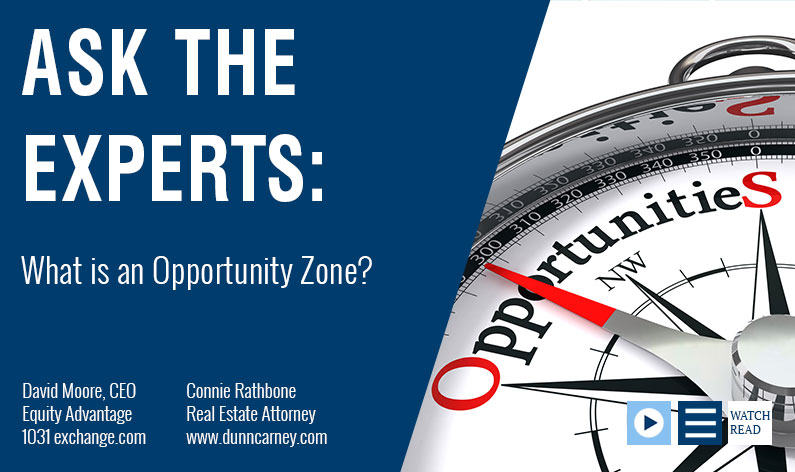David Moore with Equity Advantage asks the expert attorney Connie Rathbone with Dunn Carney about Opportunity Zones. They look at the purpose of the Opportunity Zone program and the options the program provides for investors. Get the advice you need to maximize your investment options.
Watch or Read
What Is an Opportunity Zone?
Connie Rathbone: In 2017, the legislature put together a program that was rolled out with Trump’s tax cuts in 2017. The Opportunity Zone program was created in the Obama Administration with Cory Booker and a republican legislature, bipartisan. The program has two primary purposes: To provide incentives for development in disadvantaged areas in the United States, and to help provide an incentive to release the six trillion dollars in capital gains that are sitting on the sidelines in the United States, because people won’t sell the assets related to those capital gains and pay the tax.
Putting those two incentives together, you get people to sell their capital assets and release that money, and then invest it in the areas that need economic development. That’s a great model for making sure that the funds that are being released are being spent in the way that will be to the best advantage for these communities.
What makes the Opportunity Zone program so unique is that it is the first time that any kind of tax deferral or tax incentives have been available for capital gains resulting from the sale of anything except real estate. Real estate has always had the 1031 exchange. Well now you can sell stocks, or bonds, or business, or partnership interests, or equipment. You know, capital equipment. You can take that money and invest it in a qualified opportunity fund and get the tax benefits.

David Moore: What’s interesting is that often when I’m speaking on IRAs and 401K plans, we talk about diversifying outside of Wall Street with those accounts, and this sounds like it’s a great tool to diversify outside of Wall Street. You can take that money and invest in an Opportunity Zone where development is needed.
Connie Rathbone: That’s exactly right. You can invest not only in real estate through the Opportunity Zone program, but you can also create or invest in businesses, and so it is not like-kind. You do have the 180-day reinvestment requirement, but it’s very different than a 1031 exchange in many ways. One of the most important ways is that it doesn’t have to be like-kind. You can sell stock and invest in a piece of real property. You can sell a business and invest in a business or real property. You can sell real property and invest in an Opportunity Zone corporation or business.
Navigating 1031 exchange options takes a professional, and you can count on the whole team at Equity Advantage to help. Your investments are just too important not to have an expert on your team. Give the folks at Equity Advantage a call, 503-635-1031, to get started!









